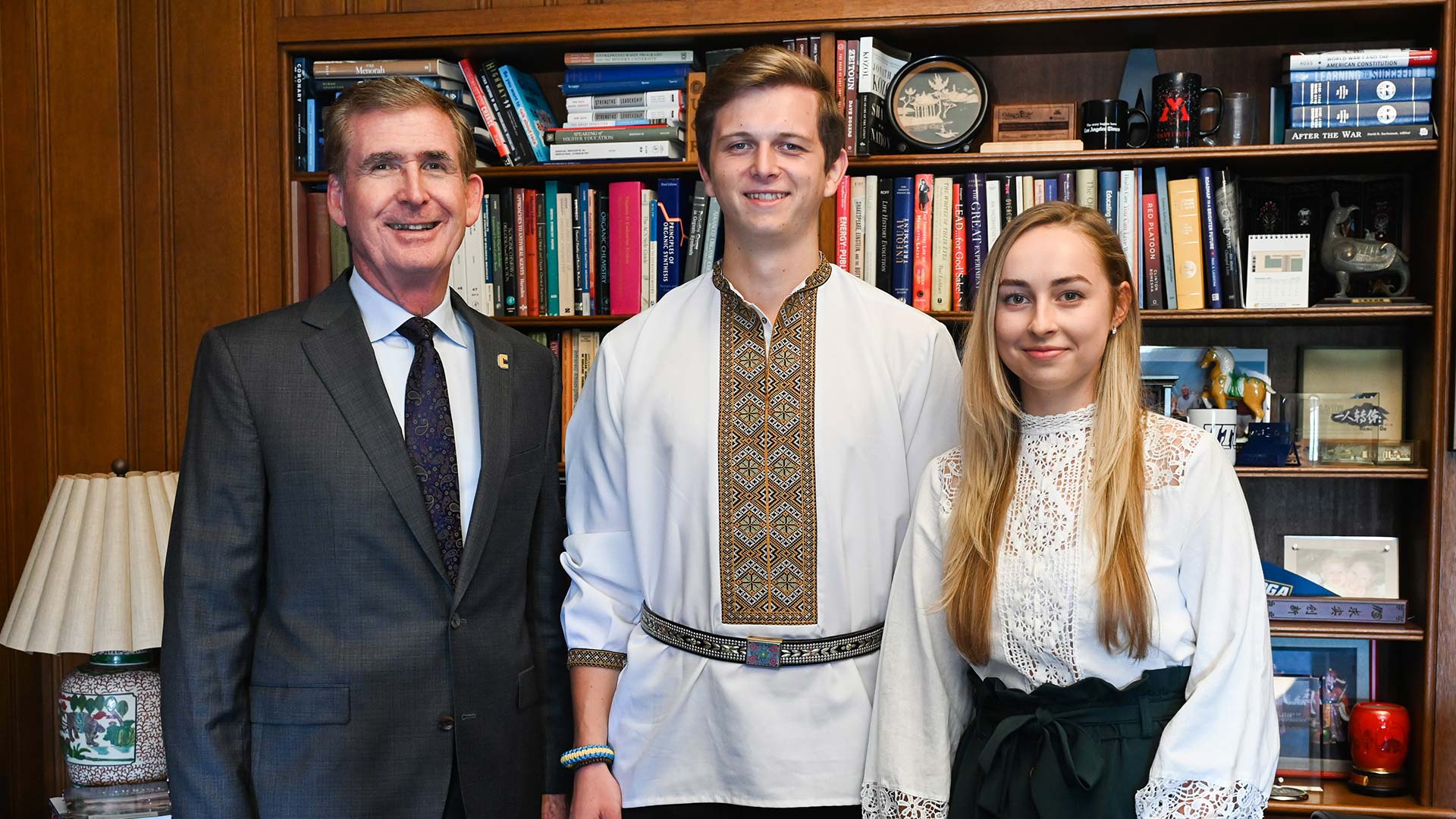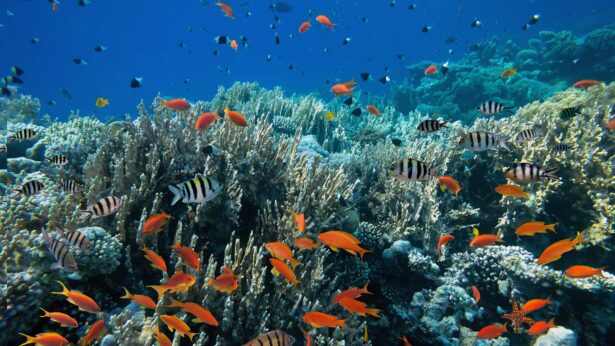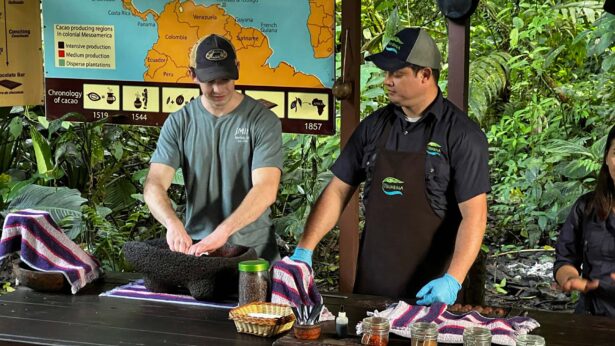Listen to this story
For graduate students Nina Klimenkova and Arsen Martyshchuk, UT Chattanooga has been a literal refuge.
In 2022, the two were finishing their undergraduate studies in Kyiv, Ukraine, when the Russian invasion changed their lives. Now, due to UTC’s Global Response Assistantship, Klimenkova and Martyshchuk are scheduled to graduate in May.
Klimenkova, who attended Taras Shevchenko National University of Kyiv as a computer science major, returned home to her family in Voznesensk after the invasion began.
“My street in my hometown was ground zero for everything when we got occupied,” she says. “We didn’t know if we’d actually survive or not. We had guns on our streets, planes, bombs—everything you can imagine, we had it.”
On March 3, 2022, Klimenkova and her family were hiding in their basement when they heard a commotion outside the door.
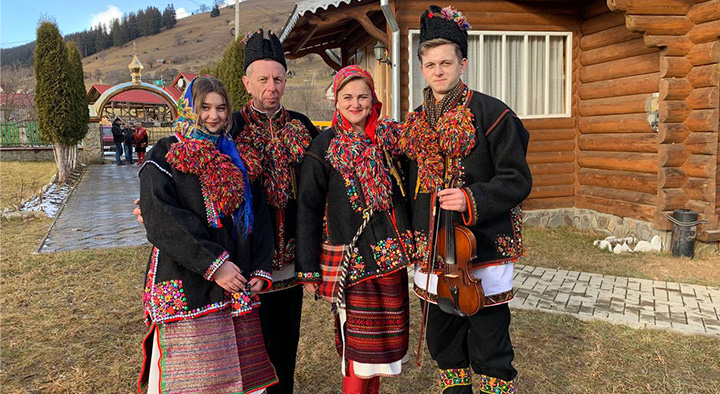
“Someone was trying to break the lock,” she says. “They were trying to come in. It was Russian occupants. They were trying to convince us that they were our soldiers, but they weren’t. We could hear it from their accents.”
Klimenkova says she and her family were ready to defend themselves and eventually convinced the soldiers to leave.
Martyshchuk had returned to his family in Krasnyk, a rural village nearly 500 miles away from where he studied international relations at Kyiv National University of Culture and Arts.
“I think every Ukrainian can share their story on the first three or four weeks of the invasion and could write a book,” says Martyshchuk.
On Feb. 21, 2022, Martyshchuk was told he must evacuate Kyiv due to the threat of Russian invasion. He returned to his family’s home, which he calls the “decision of his life,” as the area where he lived in Kyiv was bombed a few days after he left.
“When I heard that from my mom, I couldn’t believe it,” Martyshchuk says. “The whole area of Ukraine was bombed.”
At their respective homes, Klimenkova and Martyshchuk discovered UTC on EducationUSA—a U.S. Department of State platform that provides advising and college opportunities for people around the globe.
UTC’s presence on the website is thanks to Takeo Suzuki, UTC Center for Global Education executive director, who saw the devastation in Ukraine and wanted to help. After the invasion, Suzuki reached out to Ukrainians who studied at UTC, but he wanted to do more.
During a two-week span after the invasion began, Suzuki and the UTC Student Government Association proposed and received approval to create the UTC Global Response Assistantship, which would allow two students in Ukraine to pursue their master’s degrees at no expense.
After consulting with the U.S. Embassy and the Ukrainian government and jumping over many unexpected hurdles, UTC received over 200 applications.
“I was very encouraged that we, as an institution, could get there in that short period of time,” says Suzuki, who called Klimenkova and Martyshchuk to tell them of their acceptance.
Klimenkova, pursuing an MBA, and Martyshchuk, pursuing a master’s degree in public administration, arrived in Chattanooga in August 2022.
Despite the slight culture shock, they acclimated quickly.
History of the Russo-Ukrainian War
The Russo-Ukrainian War began Feb. 20, 2014, when Russia annexed Crimea, triggering a pro-Russian separatist movement in eastern Ukraine. This led to an upheaval in the Donetsk and Luhansk regions, as government buildings were seized. Despite the Minsk agreements in 2014 and 2015 that called for a permanent ceasefire, the fighting has continued for more than a decade. On Feb. 24, 2022, Russia launched a full-scale invasion of Ukraine. According to the United Nations Human Rights Office of the High Commissioner, 10,191 Ukrainian civilians died from Feb. 24, 2022, to Dec. 31, 2023. In the same time span, 34,725 Ukrainian soldiers have died, according to the website ualosses.org, which tracks the deaths.
“Education and classes in an American university are totally different,” Klimenkova says. “It was like another language, another approach, another everything. But my professors were very supportive and friendly. It helped a lot.”
Martyshchuk, who wrote his undergraduate thesis on American culture and was nicknamed ‘Local American’ by his Ukrainian classmates, found the transition easier.
However, there were a few things he didn’t expect.
“When you arrive, there’s different people and a lot of cultural differences,” he says. “You see it one way, but when you come here, it’s a different thing.”
During the summer of 2023, Klimenkova interned at Lee-Smith, a local truck dealership, while Martyshchuk, a passionate public-transit advocate, worked with the Chattanooga Area Regional Transportation Authority.
“I met a lot of new people, and they influenced me a lot,” Klimenkova says about her experience. “It’s broadened my horizons.”
Martyshchuk says his internship gave him real-world experience in transportation. That experience helped him when he began teaching transportation planning classes for UTC seniors during the fall 2023 semester.
Klimenkova also taught a business class for undergraduates.
“It was an amazing experience for me,” she says. “That’s actually why I started thinking about a Ph.D. career and becoming a professor in the future.”
With such similar experiences, the two formed a close bond. Klimenkova calls Martyshchuk her brother; they both expressed unwavering support for one another. They also have encouragement from their families.
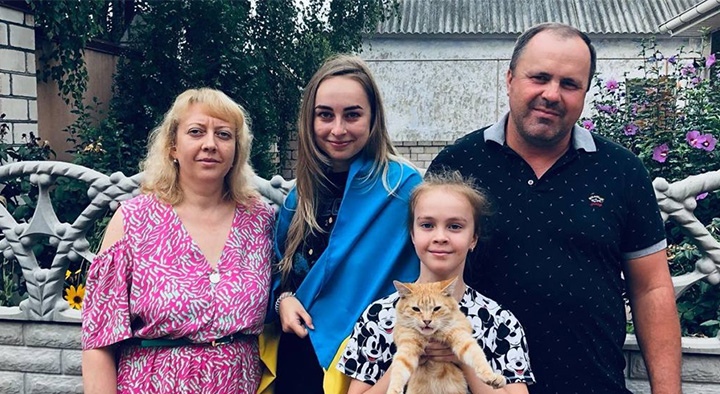
Klimenkova speaks to her family on the phone every morning and even returned home for a month in spring 2023.
In summer 2023, Martyshchuk visited his mom in Poland.
“Of course I miss my family,” he says. “But they’re happy for me.”
They both hope their education at UTC can be a beacon of change.
“I’m planning to continue to share my experiences and continue talking about Ukrainian culture and history,” Klimenkova says.
“As far as my family, their lives are going on,” Martyshchuk says, “but it’s hard because a lot of soldiers are dying. We have funerals every week. People keep getting drafted. It’s emotionally hard.
“Speaking about Ukraine with your friends, professors and family is the greatest thing right now,” he continues. “Just talking and reminding the world of the atrocities going on.”
As they finish their last semester at UTC, they have been reflecting on their journeys.
“These two years have taught me to be open to everything,” Martyshchuk says, adding UTC has exposed him to diverse cultures, religions and people.
“It’s absolutely another world,” Klimenkova says. “It’s different, it’s very cool and now I’m really into it.
“Maybe I’m not ready to say goodbye to UTC.”
